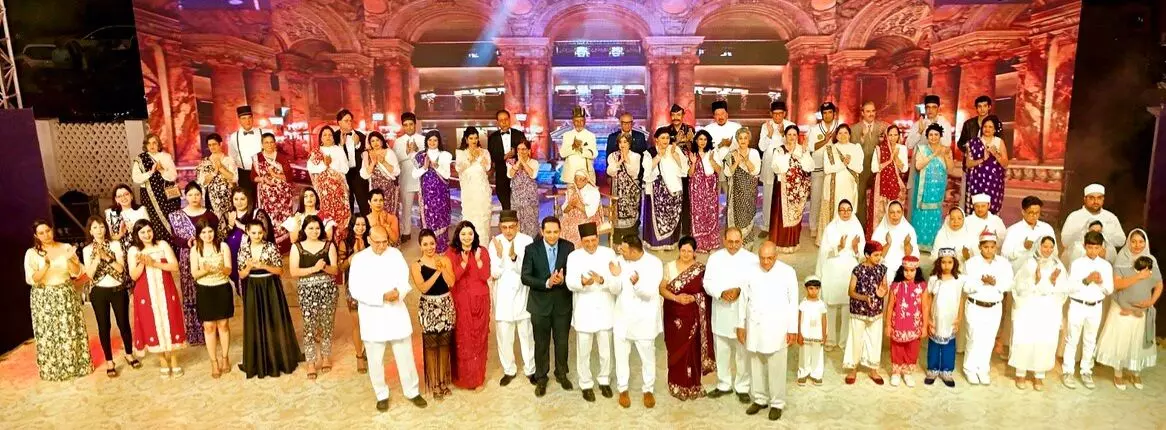Foot-tapping music to sumptuous food: How Zoroastrians celebrated Jamshedi Navroz in Secunderabad
Navroz means New Day and this day is named after King Jamshed of ancient Persia, who was the first King to celebrate it.
By Beyniaz Edulji Published on 23 March 2024 2:47 AM GMT
Hyderabad: Jamshedi Navroz is celebrated on March 21 every year. It is different from the other Navroz or New Year celebrated by the Parsis of India in August after 18 days of prayers.
Jamshedi Navroz is celebrated by the Zoroastrians of India to mark the Spring Equinox and the harvest festival. Navroz means New Day and this day is named after King Jamshed of ancient Persia, who was the first King to celebrate it.
Haft Sin table:
At the exact time of the Spring Equinox, traditional Zoroastrians as well as Iranians of other faiths set out seven items beginning with the letter ‘S.’ These include sprouts, wheat germ, apples, pomegranate, and garlic; gold or silver coins, vinegar, a lit ‘diya’, a mirror, rosewater, painted eggs, dry fruit, sweets, and different kinds of fresh fruit. Some even place a goldfish or an orange in a bowl of water on the Navroz table.
Sprouts represent the rebirth of spring, apples are for beauty, rosewater for sweetness, goldfish for life, garlic for health, coins for prosperity, and the mirror and ‘diya’ represent light and goodness.
Celebrated all over the world
Navroz has been celebrated for more than 3000 years by the people of Iran and also in many other parts of the world, including Iran, Kurdistan, Turkey, Iraq, India, Afghanistan, Tajikistan, Uzbekistan, Azerbaijan, Kazakhstan, and Kyrgyzstan. It is a public holiday in many countries. The General Assembly of the United Nations has now recognized the International Day of Navroz and Google even had a Navroz Doodle this year.
Navroz Day
Most Zoroastrians visited their three fire temples (one in Hyderabad and two in Secunderabad) on the morning of Jamshedi Navroz wearing new clothes. Women were looking elegant in saris worn in Gujarati style over their right shoulder, all the better to display their intricate hand-embroidered borders and jeweled brooches.
The men were looking dapper in their white ‘daglis’ or overcoats and trousers. The ‘jasan’ or thanksgiving prayer was well-attended and refreshments were served later.
Navroz Fusion Fiesta
In the evening, the Zoroastrians of the twin cities gathered in large numbers for the Navroz Fusion Fiesta function at the Parsi Dharamsala, a beautiful heritage venue for many festivities for a rocking evening of cultural and musical entertainment followed by a sumptuous dinner served on banana leaves. More than 1000 people from all communities attended this function.
Many of the Parsi women wore their elegant embroidered Gara Saris to very good effect. A Haft Sin table was present too.
Zoroastrian Culture Showcased
The event started at 7.30 pm with President Jehangir Bisney’s address, followed by a game of Tombolo, a Parsi song, skits showing the Persian migration to India, a Parsi prayer, enactment of a Parsi wedding where the bride came in a 1947 vintage car and the participants showcased famous Parsi Legends like Field Marshal Sam Manekshaw, JRD Tata, singer Freddie Mercury, Jurist Nani Palkhivala, Homi Bhabha, Cyrus Poonawalla, cricketer Farokh Engineer and maestro Zubin Mehta to name a few.
The ramp walk proved very popular with the crowd. The 63 participants all put up a splendid and diverse cultural show.
Music and Dance
Celebrity Musician Behram Siganporia from Bangalore played many hit songs. The dance floor was put to good use too.
Parsi Food at its best
Guests made a beeline once dinner was announced and it was ‘Jamvo Chalo’ or ‘let us eat’ in earnest with the ‘lagan nu bhonu’ feast served on individual banana leaves. Akuri, a famous egg dish, Patra ni Machi (Fish wrapped in banana leaves), Sali Marghi or chicken with potato straws, and Mutton Pulao served with masala dal, all washed down by a drink aptly named Bawa.
Sweet vermicelli and kulfi were also served as desserts to complement the sumptuous food.
